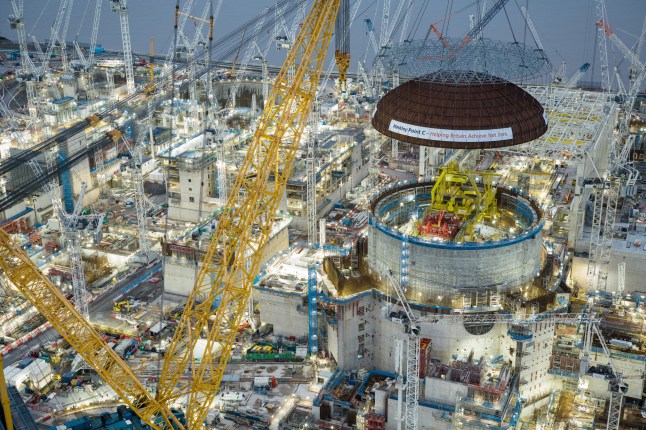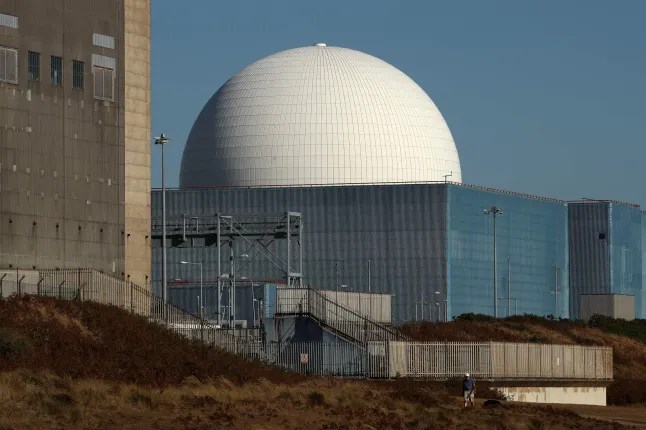
Chinese firms are using the UK to protect their nuclear blueprints — despite being sanctioned in the US over fears of military activity.
The state-owned companies are using the British patenting office as Beijing forges ahead with new reactors to power its own country while targeting the West with espionage and cyber-attacks.
Documents show how the energy giants are drawing up designs for advanced fuel technology and ‘in-depth’ protection of plants.
The applications have emerged as the government seeks to keep the Scunthorpe steel plant running after using emergency legislation to take over the running of British Steel from its Chinese owners.
The crisis followed GCHQ director Anne Keast-Butler warning that Beijing ‘is looking to shape global technology’ in its favour and the agency now devotes ‘more resources to China than any other single mission.’
The latest patent has been filed by state-owned companies China General Nuclear Power Corporation (CGN), China Nuclear Power Technology Research Institute Co. Ltd and CGN Power Co. Ltd.
Published in the official journal, the blueprint shows a 3D simulation system helping to improve safety and performance at plants.
Another application by China Nuclear Power Engineering Co. Ltd concerns a method for evaluating safety at a power plant.
The US Bureau of Industry and Security, Commerce says that CGN and the research institute have been involved in ‘efforts to acquire advanced US nuclear technology and material for diversion to military uses in China.’
Risk management expert Dr Simon Bennett, author of the book ‘Atomic Blackmail?’, highlighted China’s stake in the UK’s nuclear industry.
He said: ‘Chinese involvement in Britain’s critical national infrastructure, for example, nuclear and steel, provides the context to China’s access to the UK patent system. For better or worse, the government is in bed with China, which gives Beijing traction over British interests.
‘The patents filed by the Chinese companies reflect this background of co-operation between the two countries, which is induced by the policy straitjacket that is the Climate Change Act and its net-zero ambition.
‘It is hard to overstate how much this legislation shapes, or distorts, depending on your point of view, British policy-making.’

Dr Bennett, of the University of Leicester, believes the Climate Change Act, aimed at reducing greenhouse gas emissions, has led to the UK making unfavourable deals with Chinese firms.
He said: ‘The Act has led to the UK courting the Chinese state, including through the Hinkley Point C venture.
‘Countries such as China and India must be laughing at us as they file plans and forge ahead with their own power industries, including through coal-fired plants, while our government desperately tries to meet its over-ambitious commitments.’
While the designs make no reference to military uses, they have been filed at a time of heightened concern in the West about China’s covert activities, including espionage and cyber-hacking.
Outwardly, Beijing has made no secret of its nuclear ambitions, either for defence or energy purposes.
On its website, the China Nuclear Power Engineering Co. carries an article outlining the country’s aim to become a ‘nuclear industrial power’ by 2035 and describes all-round uses for the industry, including defence and the provision of ‘strong nuclear weapons’.
Detailed plans reveal nuclear ambitions
The latest plan filed by Chinese nuclear power firms, published on February 25, is for a ‘three-dimensional test system, and three-dimensional test device’ for simulating the workings of the critical reactor pressure vessel in a nuclear power plant. The plan was filed by the China General Nuclear Power Corporation, China Nuclear Power Technlogy Research Institute Co. Ltd and the CGN Power Co L.
Another design by the China Nuclear Power Engineering Co. Ltd, which does not appear on the US sanctions list but is a ‘brother’ company of the other firms, has filed a safety plan for ‘in-depth’ defence at a power plant. Both blueprints have been granted.
The scope of the ambitions can also be seen in China’s plans to build a nuclear power plant on the moon in order to fuel a research station it intends to open with Russia there. Beijing plans to have the permanent lunar base in operation within 10 years.
On home soil, China approved 10 new reactors this week, the fourth year running that it has commissioned the building of at least that number.
Xi Jinping’s nuclear ramp-up is in contrast to the Chinese involvement in Britain’s power sector, which has been thrown into the spotlight by the Scunthorpe crisis, where the government has secured raw materials to keep the plant going for the next few months.
Opinions differ on the risks posed by Chinese involvement in the UK’s critical infrastructure, but there is no doubt that successive governments have cooled on the source of investment.

R ‘Ray’ Wang, principal analyst and founder at Constellation Research, a technology research and advisory company based in Silicon Valley, said: ‘China likes to play both sides. They are bad actors in world trade and they are bad actors in the patenting world.
‘They like to go in and file patents to protect their IP while stealing everyone else’s IP and claiming it as their own.
‘This is essentially what the challenge is.
‘With the overall energy industry, whether it be a small modular reactor, the EV side or nuclear energy, they are trying to socialise and then make their corporate espionage their own IP.
‘Essentially, they are stealing the IP and then applying for a patent so that no one will steal from them. They are doing the same thing across the world with critical infrastructure technology but it’s a little more blatant in the UK and a little less so here in the US.
‘Part of it is because of the UK’s relationships with China starting with power, whether it be solar panels or EVs including the electric black cabs, which are made in China.
‘Another part is the push back from President Trump, who is the one spotlighting this overarching issue, which is going to continue amid the trade war. The question for the UK is who it trusts more; whether it be a US firm like Cisco or a Chinese firm like Huawei?’

China has been involved in the UK’s civil nuclear industry over the last decade but the working relationship has taken a downwards turn in recent years. CGN’s one-third stake in Hinkley Point C, which may not open until 2031, is one of the deals in question.
As Western-Chinese relations have deteriorated, the firm has reportedly ruled out any further investment in what was intended to be the first new nuclear power plant to be built in the UK in nearly 30 years.
CGN also had a 20% stake in the Sizewell C nuclear reactor power venture in Suffolk before being bought out by the government in 2022.
Earlier this month, it was reported that the company will no longer build a nuclear power station named Bradwell B in Essex in conjunction with French-owned EDF. The corporation is not expected to submit planning applications for the site, according to government and industry sources who spoke to the Times.
An Intellectual Property Office spokesperson said: ‘Overseas companies, including from China, can register patents in the UK through the IPO – just as we expect UK companies to be able to register patents overseas.
‘The process of obtaining a patent requires that the details of the innovation are published on a publicly accessible register of patents, ensuring transparency.
‘Separate powers enable the government to restrict overseas involvement in sensitive sectors where necessary for national security reasons.’
The Department for Energy Security and Net Zero also maintained that safeguards are in place to protect British interests.
A spokesperson told Metro: ‘Through the National Security and Investment Act, we have a robust set of powers to restrict overseas involvement within the civil nuclear sector and sensitive nuclear information is protected by the Office for Nuclear Regulation.’
In relation to Scunthorpe, the Chinese embassy in the UK has said that British Steel was ‘loss-making’ before private firm Jingye kept it afloat and attacked the ‘anti-China rhetoric of some individual British politicians.’
A spokesperson said: ‘Generally speaking, Chinese companies in the UK have operated in compliance with law and achieved steady progress.
‘They have made positive contributions to the local economy.
‘According to statistics available, Chinese companies in the UK have contributed over 115 billion pounds to the UK economy and created nearly 60,000 jobs.’
Metro has attempted to reach the Chinese companies and the country’s UK Embassy for comment.
Do you have a story you would like to share? Contact josh.layton@metro.co.uk


